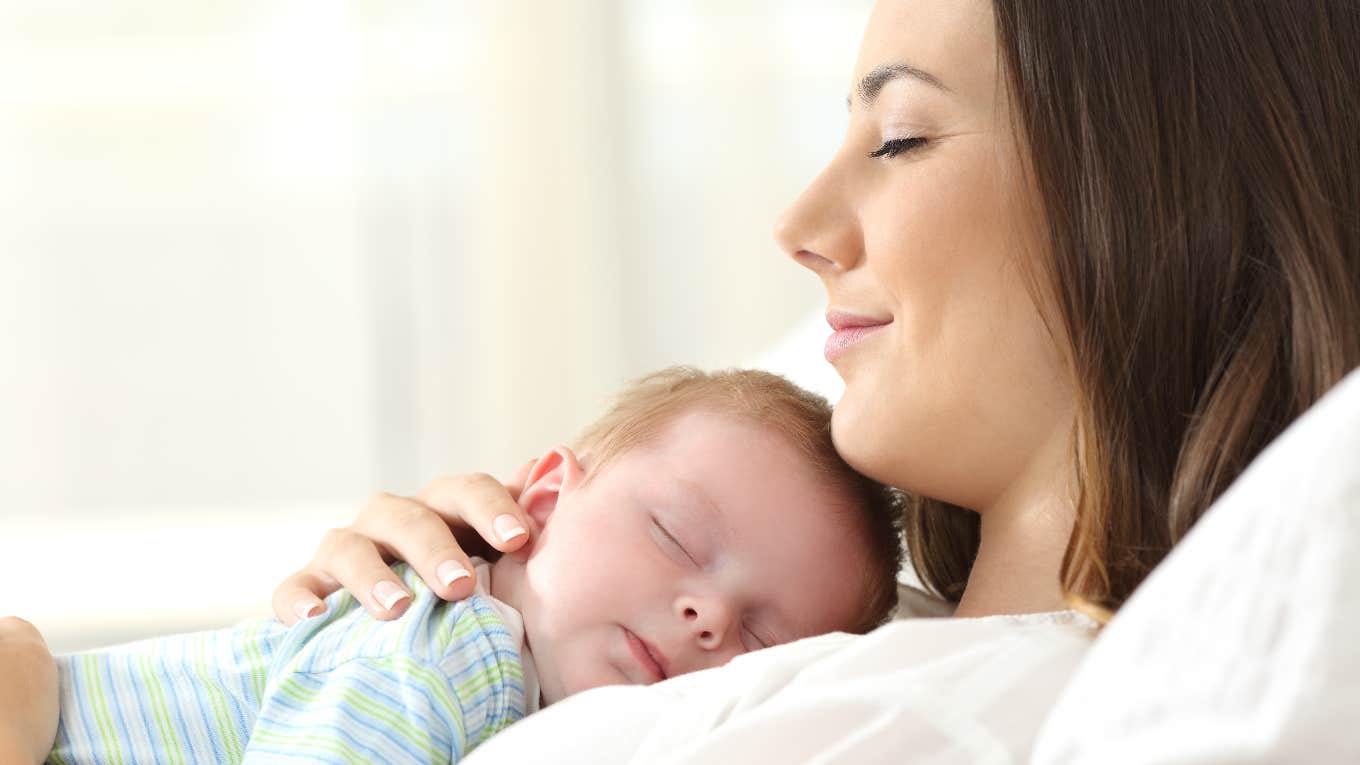Husband Cries When His Wife Refuses To Take Care Of The Children And House For 15 Days After Giving Birth
Some people supported her need for rest, while others felt she should contribute more.
 Antonio Guillem / Shutterstock
Antonio Guillem / Shutterstock After a woman gave birth to her second child, she decided to take a couple of weeks to rest and recover. While she did, she expected her husband to keep up with all of the housework and take care of their 5-year-old child.
However, it quickly proved to be too much for her husband, and he eventually broke down to her, overwhelmed by all of the responsibilities. Now, the woman cannot help but wonder if she was wrong for refusing to help out.
The woman refused to help out around the house for the first 15 days after giving birth.
Sharing her story to the AITA subreddit, the 26-year-old woman revealed that she gave birth to her second child just days ago. While she claimed to have had a smooth at-home delivery with no complications, she rightfully wanted a couple of weeks to recover fully.
The woman sought to follow a recovery plan dubbed the "5-5-5 Method," or five days in the bed, five days on the bed, and five days near the bed.
The woman would spend the first five days after birth resting in bed and nursing her baby, the next five days moving around a bit to spend time with her firstborn, and the last five days doing some light chores such as folding laundry and diaper changing while standing no more than 30 minutes.
The woman said that she followed the 5-5-5 method after the birth of her first child, to the dismay of her husband. "With my first and this pregnancy, I made it clear to my husband I wanted to follow the 5-5-5 rule," she shared. "He seemed to drag his feet, but because he wanted kids more than I did, he agreed."
However, when it came down to actually giving his wife the time to recover, he seemed to struggle, unable to keep up with the housework and childcare.
“This baby is very colicky, and my husband is the one having to get out of bed, walk around with her and sit in the rocking chair, do diapers, and take her and our son on walks to get some sunshine,” the woman wrote. Adding to their stress, their older son has also started acting out since becoming a big brother.
Still, it's not as if the new mother hung her husband out to dry. The woman "prepared a month's worth of freezer meals so for dinner all he has to do is throw the disposable tin in the oven and walk away for a few hours."
But after a few days, the woman’s husband approached her in tears.
 Photo: YAKOBCHUK VIACHESLAV / Shutterstock
Photo: YAKOBCHUK VIACHESLAV / Shutterstock
“Today he came to me crying saying it was all too much and he couldn’t do this by himself,” she wrote. “I reminded him that he agreed to it, and I have to go back to work shortly after the 5-5-5 is up, so I need to be as rested and healed as possible so I can better perform tasks at work then come home and perform tasks as well.”
Even after the woman’s husband begged her to help out and spend some time with their 5-year-old son, she refused, telling him that she would start helping out again in eight days.
Redditors were divided over the woman’s situation.
Some people argued that the woman was not asking much of her husband and that she was entitled to rest as long as she pleased after giving birth.
“What really bothers me about this is that he’s been doing this for two days. Just two days so far. And he’s already welching?” one user commented.
“I assume all the stuff that he's crying about is the stuff that you are going to be expected to do on an ongoing basis after you return to work?” another Redditor suggested. To that, the mom responded: "Yes, I for the most part do the cooking, cleaning, 90% of the childcare. He mostly just feeds the dog and occasionally walks him."
Many online also agreed that the new mom deserved rest as she had just given birth, an exhausting and often distressing experience.
 Photo: Trendsetter Images / Shutterstock
Photo: Trendsetter Images / Shutterstock
However, others argued that the woman should still be helping out more with the children since it was an expectation of parenthood.
“You are entitled to rest. That's not up for debate. But you don't need to stay in, on and near your bed for two weeks. You had a baby, not major surgery,” one user wrote. “While you can't do what a typically healthy human can do, you can still help out more.”
“While it's nice to just lie around for 15 days, life gets in the way. You either want kids and help like a parent would, or you don't,” another user commented.
Others noted that while rest is important after giving birth, remaining in bed for 5 days straight could be dangerous.
In some cases, lying down and remaining still for an excessive amount of time after birth can result in complications such as blood clots and pulmonary embolisms.
“The blood gets extra sticky during late pregnancy to compensate for and reduce blood loss at birth. If you’re genuinely barely moving for 15 days and have any of the above conditions, your risk of having a stroke (as a result of that extra sticky blood not being pushed around your veins from movement and causing clots) is very high,” a reported nurse commented on the woman’s post.
“I agree the husband should be prepared to take care of the household duties, including care of your other child, but please make sure you do get up and move around,” they continued.
According to doctors, if women have had an uncomplicated delivery, they can generally resume normal household chores and activities within three weeks postpartum or 21 days — 6 days longer than this woman's plan extends.
"But always listen to your body," Dr. Nandini Raghuraman, M.D., MSCI, an OB-GYN, told Parents. "If there is any discomfort, immediately stop and rest."
While mothers certainly bear most of the physical and emotional damage when it comes to having children, this doesn’t mean that fathers are not overwhelmed with a new baby as well.
Some people suggested that the woman’s husband's tearful reaction was due to sleep deprivation and stress as he adjusted to their new lives. While the woman’s need for rest is valid, so are her husband’s feelings.
As they navigate going from one-to-two children and postpartum recovery, they could benefit from having a conversation and reaching fair compromises. Effective communication allows parents to discuss and divide responsibilities related to childcare, household chores, and other tasks. This helps prevent misunderstandings and ensures that both parents are equally involved in childcare duties.
Parents need to be on the same page when choosing childcare options, making decisions about the baby's schedule, maintaining chores around the house, and cooking dinner.
Megan Quinn is a writer at YourTango who covers entertainment and news, self, love, and relationships.

